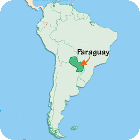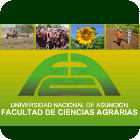Plant breeding programs in Paraguay
 The Republic of Paraguay is one of the two landlocked countries which lie entirely within the Western Hemisphere, in South America. In Paraguay, the agricultural and forest sector is the base of the country’s economy and generates 25% of the GDP. Soybean is the main product of Paraguay but cotton also has a high economic and social importance in spite of a recent cotton production crisis.
The Republic of Paraguay is one of the two landlocked countries which lie entirely within the Western Hemisphere, in South America. In Paraguay, the agricultural and forest sector is the base of the country’s economy and generates 25% of the GDP. Soybean is the main product of Paraguay but cotton also has a high economic and social importance in spite of a recent cotton production crisis.
The national research system in Paraguay is among the oldest in the hemisphere, begun in 1887. Today, the investments and the institutions of agricultural R&D in Paraguay are small and depend to a great extent on public research funding. MAG/DIA is responsible for the public research and is the main institution where plant breeding of economically important crops is developed.
Cotton has always gathered the main part of Paraguayan plant breeding budget because it is the main crop of social significance, and MAG directs its resources to the development of smaller-scale agriculture. The wheat program also had a great impetus since the 1980s, to allow import substitution. Today, maize, soybean and sugarcane focus more and more attention. Research activities are of a relatively modest nature due to an inadequate number and lack of training of staff involved.
The main limiting aspect in Paraguayan plant breeding programmes is the inadequate number and level of education of plant breeders. The lack of financial resources to carry out field and laboratory experiments is also critical.
Research and education institutes with activities in plant breeding
Public Institutes
 |
Agricultural Research Directorate - Dirección de Investigación Agrícola (DIA)
|
 |
Faculty of Agricultural Sciences - Facultad de Ciencias Agrarias, Universidad Nacional de Asunción (UNA)
|
Private Institutes
 |
Technological Centre of Paraguay - Centro Tecnológico Agropecuario del Paraguay (CETAPAR)
|
 |
Algodonera Guaraní S.A. (AGUSA)
|
______________________________________
Information by Lidia Quintana de Viedma (2008) - Information based on the Paraguay's full report from the PBBC survey. Last revised 25-03-2010, GIPB.
